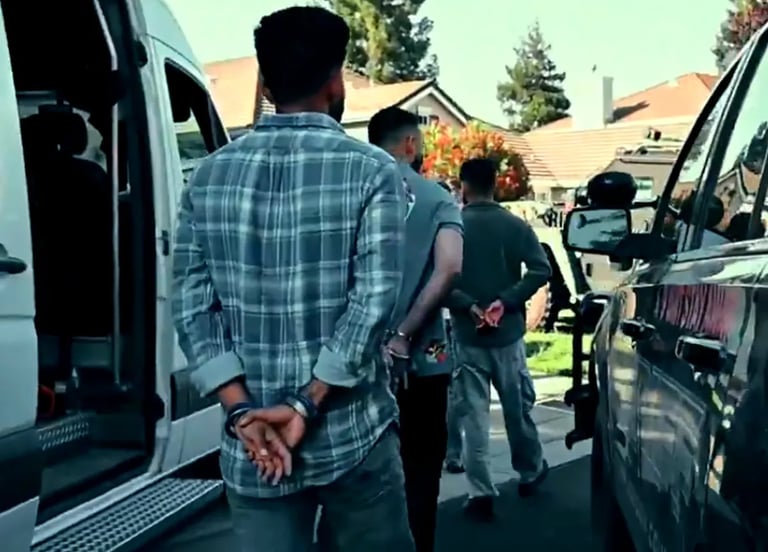Eight Indian-Origin Men Arrested in California for Gang Violence, Raising Hope for Safer Communities
Eight Indian-origin men were recently arrested in California, accused of involvement in serious gang-related crimes including kidnapping, torture, extortion, and intimidation. These arrests have shaken local communities and brought to light the deep challenges law enforcement faces in tackling violent gangs that affect people’s lives every day.
NATIONAL
Thinkbrief
7/19/20252 min read


The arrests happened on July 11, 2025 after months of careful investigation by the FBI as part of their Summer Heat operation aimed at cracking down on violent offenders. For many in the affected neighborhoods, these men’s actions weren’t just news they were the source of fear and uncertainty that disrupted daily life.
The investigation started when a victim bravely came forward after being kidnapped and tortured in June. This person, targeted for information related to the local Indian community, gave police vital clues that eventually led to the arrests. Such courage from community members is crucial in fighting back against those who try to silence others through violence.
One of the arrested, Pavittar Singh, is believed to be linked to Babbar Khalsa International, a banned terrorist group known for its violent activities. Singh is said to be the leader of the Pavittar Manjha Gang, which has been behind numerous crimes causing pain and suffering for many families in California.
When authorities raided their hideout, they found weapons, ammunition, and cash tools used to maintain control through fear and violence. But beyond the weapons and money, what truly concerns many are the lives affected the people who have lived with the threat of harm for far too long.
All eight men now face serious charges that could keep them behind bars for life. The justice system will decide their fate, but for the community, these arrests represent hope. Hope that safety can be restored and that voices silenced by intimidation can finally be heard.
This case is part of a larger pattern of gangs operating beyond borders, weaving complex webs of crime that affect immigrant communities and society at large. Indian-origin gangs, some linked to extremist groups, have increasingly caused trouble far from their original homes, bringing violence that threatens peace and harmony.
Earlier this year, law enforcement arrested another alleged gang member, Happy Passia, accused of brutal attacks and extortion. Cases like these show how far-reaching and complicated the problem is and how important it is for countries to work together to keep their communities safe.
For many in the Indian-American community, these events are painful reminders of the challenges faced by immigrants trying to build peaceful lives. Leaders and residents have condemned the violence and are working with authorities to ensure their neighborhoods remain safe. They also emphasize the need to support young people, offering them alternatives so they don’t fall into the cycle of crime.
Authorities are encouraging anyone with information to come forward without fear, assuring protection and support for witnesses. This trust between community and law enforcement is vital to breaking the hold gangs have through fear and silence.
However, challenges remain. The legal process can be complicated by immigration status and the cross-border nature of these gangs. Still, officials are determined to keep pushing forward, using every tool and resource to dismantle these criminal networks.
Behind the headlines and court cases are families who live in hope that justice will bring peace. Parents want their children to grow up safe. Neighborhoods want to feel secure again. Communities want to heal.
This story is a reminder that crime isn’t just about arrests or charges it’s about people’s lives disrupted by fear and violence. But it’s also a story about courage, about neighbors standing up, about law enforcement and communities coming together.
As the case moves forward, many are watching closely, hoping these arrests mark a turning point. That with continued vigilance and cooperation, stronger, safer communities can emerge. That peace can take root, and that the future will hold fewer stories of pain and more stories of resilience and hope.

